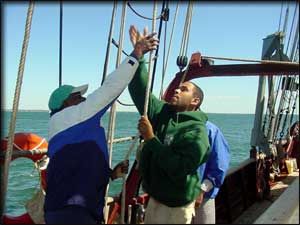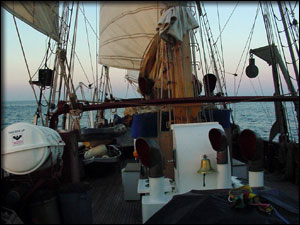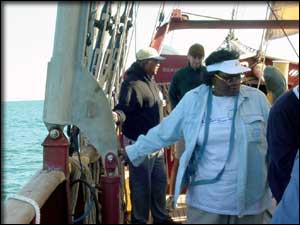| Executive
Summary
The Sea Education Association
(SEA) plans to convene three workshops and a symposium to  develop
a program to encourage students of under-represented groups to pursue
careers in oceanography. Participants in the workshops would be
faculty and administrators from minority-serving institutions. The
workshop goals would be: a) to learn first-hand about SEA undergraduate
program and b)to devise or refine a plan to use the SEA boats and
campus to encourage students from minority-serving institutions
to pursue careers in ocean sciences. There would be one workshop
each year in 2002, 2003 and 2004. The symposium would be held in
2005 and would bring workshop participants back to SEA to review
their effectiveness of the program. develop
a program to encourage students of under-represented groups to pursue
careers in oceanography. Participants in the workshops would be
faculty and administrators from minority-serving institutions. The
workshop goals would be: a) to learn first-hand about SEA undergraduate
program and b)to devise or refine a plan to use the SEA boats and
campus to encourage students from minority-serving institutions
to pursue careers in ocean sciences. There would be one workshop
each year in 2002, 2003 and 2004. The symposium would be held in
2005 and would bring workshop participants back to SEA to review
their effectiveness of the program.
SEA  provides
an unusually effective program that encourages both and understanding
of and a commitment to the ocean. Many students go on to careers
in ocean-related fields, and a significant number continue to get
advanced degrees in oceanography. The program provides a rigorous
undergraduate academic experience in an environment that is personally
challenging and highly rewarding. In addition, the close quarters
on the boat and the teamwork required to operate safely at sea help
students understand and accept the strengths and weaknesses of their
shipmates and of themselves. provides
an unusually effective program that encourages both and understanding
of and a commitment to the ocean. Many students go on to careers
in ocean-related fields, and a significant number continue to get
advanced degrees in oceanography. The program provides a rigorous
undergraduate academic experience in an environment that is personally
challenging and highly rewarding. In addition, the close quarters
on the boat and the teamwork required to operate safely at sea help
students understand and accept the strengths and weaknesses of their
shipmates and of themselves.
A well-designed SEA program
would expose minority students to oceanography and ocean life in
a positive light, thereby making careers in ocean sciences more
accessible. However, a program designed by SEA alone would not necessarily
be attuned to the needs and challenges of minority  students,
nor would it necessarily have support from minority serving institutions.
By drawing its participants from the faculty and administrators
of such institutions, the proposed workshops should be able to develop
a plan that both fits the needs of minority students that would
benefit from the program. students,
nor would it necessarily have support from minority serving institutions.
By drawing its participants from the faculty and administrators
of such institutions, the proposed workshops should be able to develop
a plan that both fits the needs of minority students that would
benefit from the program.
|

 develop
a program to encourage students of under-represented groups to pursue
careers in oceanography. Participants in the workshops would be
faculty and administrators from minority-serving institutions. The
workshop goals would be: a) to learn first-hand about SEA undergraduate
program and b)to devise or refine a plan to use the SEA boats and
campus to encourage students from minority-serving institutions
to pursue careers in ocean sciences. There would be one workshop
each year in 2002, 2003 and 2004. The symposium would be held in
2005 and would bring workshop participants back to SEA to review
their effectiveness of the program.
develop
a program to encourage students of under-represented groups to pursue
careers in oceanography. Participants in the workshops would be
faculty and administrators from minority-serving institutions. The
workshop goals would be: a) to learn first-hand about SEA undergraduate
program and b)to devise or refine a plan to use the SEA boats and
campus to encourage students from minority-serving institutions
to pursue careers in ocean sciences. There would be one workshop
each year in 2002, 2003 and 2004. The symposium would be held in
2005 and would bring workshop participants back to SEA to review
their effectiveness of the program. provides
an unusually effective program that encourages both and understanding
of and a commitment to the ocean. Many students go on to careers
in ocean-related fields, and a significant number continue to get
advanced degrees in oceanography. The program provides a rigorous
undergraduate academic experience in an environment that is personally
challenging and highly rewarding. In addition, the close quarters
on the boat and the teamwork required to operate safely at sea help
students understand and accept the strengths and weaknesses of their
shipmates and of themselves.
provides
an unusually effective program that encourages both and understanding
of and a commitment to the ocean. Many students go on to careers
in ocean-related fields, and a significant number continue to get
advanced degrees in oceanography. The program provides a rigorous
undergraduate academic experience in an environment that is personally
challenging and highly rewarding. In addition, the close quarters
on the boat and the teamwork required to operate safely at sea help
students understand and accept the strengths and weaknesses of their
shipmates and of themselves. students,
nor would it necessarily have support from minority serving institutions.
By drawing its participants from the faculty and administrators
of such institutions, the proposed workshops should be able to develop
a plan that both fits the needs of minority students that would
benefit from the program.
students,
nor would it necessarily have support from minority serving institutions.
By drawing its participants from the faculty and administrators
of such institutions, the proposed workshops should be able to develop
a plan that both fits the needs of minority students that would
benefit from the program.